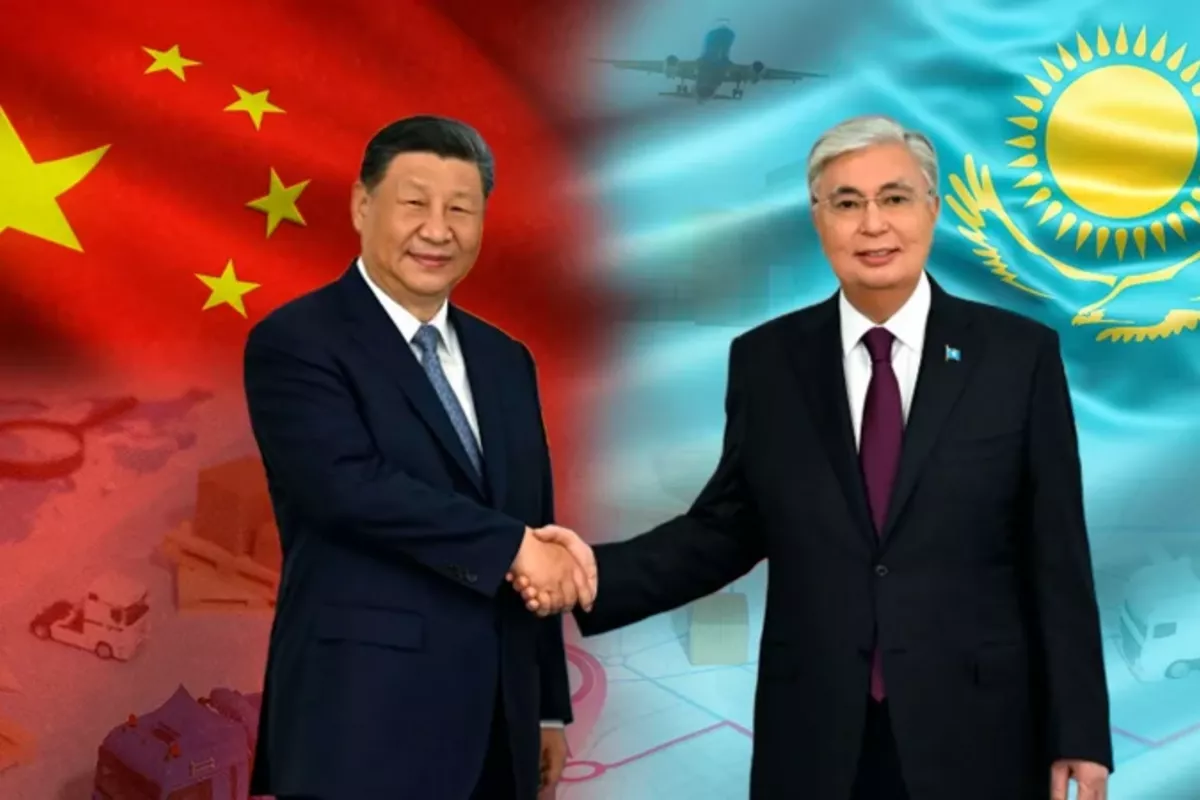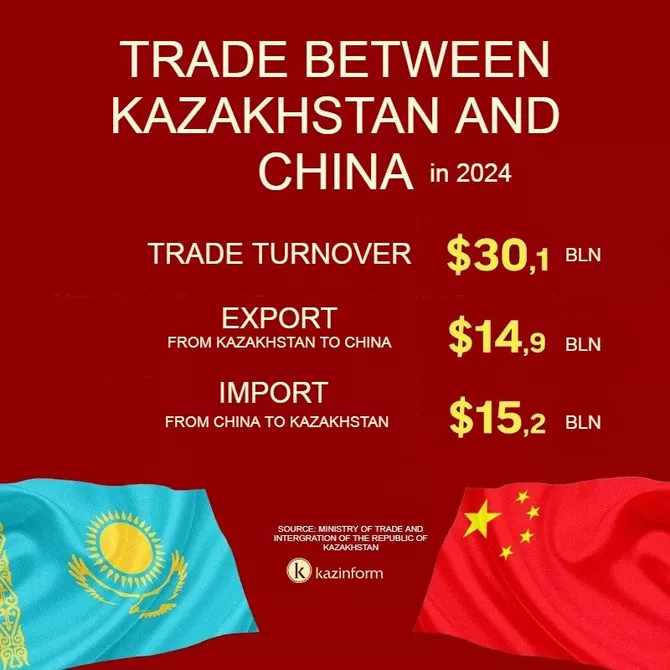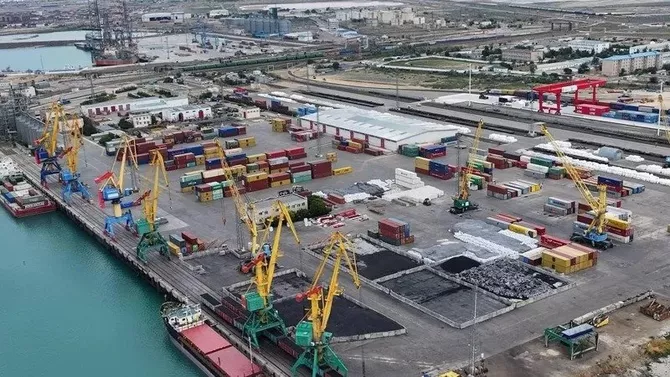
Collage credit: Kazinform / Freepik / Akorda.kz
Chinese President Xi Jinping is scheduled to travel to Astana for a working visit, which will coincide with the second Central Asia-China summit, expected to gather regional heads of state, The Caspian Post reports citing Kazinform.
Chinese diplomacy: a school of ancient wisdom
President Xi last visited Kazakhstan in July 2024 at the invitation of Kazakh President Kassym-Jomart Tokayev.
Following the talks, the two countries signed more than 30 agreements covering trade, technical and economic cooperation, transport, infrastructure and engineering, energy, industry, agriculture, and education.
As Aliya Musabekova, Chief Expert at the Asian Studies Department of the Kazakhstan Institute for Strategic Studies under the President of Kazakhstan (KazISS), notes, the foundation of Kazakhstan-China relations lies in deep mutual respect, shared interests, and a high level of political trust.
“Over the past three decades, we’ve built a solid foundation: border issues have been resolved, a legal framework for cooperation is in place, and high-level meetings take place with enviable regularity. China's designation of Kazakhstan as a ‘permanent comprehensive strategic partner’, a unique status in Chinese diplomacy, speaks to the long-term nature of these relations,” she emphasized.
A key trade partner
China remains one of Kazakhstan’s most important trade and economic partners. According to the Ministry of Trade and Integration, bilateral trade between the two countries reached $30.1 billion in 2024.

Kazakhstan’s exports to China grew by 1.6% last year, totaling $14.9 billion. The main export items included copper, uranium, ferroalloys, and ores and concentrates of precious metals.
Imports from China to Kazakhstan decreased by 1.5% in 2024, amounting to $15.2 billion. These included automobiles, mobile phones, computer equipment, and other goods.
This year, however, trade between the two countries has seen a slight decline. From January to March 2025, bilateral trade totaled $5.9 billion - down 5% compared to the same period last year ($6.3 billion). Kazakhstan’s exports to China dropped by 21.3% to $2.5 billion, while imports from China rose to $3.5 billion.
Target: $100 billion in trade
Kazakhstan and China have achieved remarkable results in economic cooperation. Today, over 50 joint industrial projects are operating in Kazakhstan.
Experts attribute this success to the strategic alignment of secnational interests, effective infrastructure initiatives, and the work of cooperation platforms such as the Kazakhstan-China Cooperation Committee and the Business Council.
“Looking ahead, we expect this partnership to deepen further, with the goal of increasing trade volume to $100 billion. Kazakhstan is not only strengthening its role as a transit hub but also aims to become a center of innovation, sustainable development, and diplomacy. Our partnership with China will remain crucial in reaching these ambitious goals. Joint projects in transport corridors, energy, and green technologies are helping Kazakhstan position itself as a key integrator of regional value chains,” says Aliya Musabekova.
According to Aidar Amrebayev, Director of the Center for Political Studies, China has recently become Kazakhstan’s top foreign trade partner, as the share of Russia and Western countries continues to decline. Sustaining this trend, he says, is now a key priority for the Kazakhstan economy.
“Economic ties between Kazakhstan and China have been developing rapidly. Given the structure of our economy, joint ventures focus on resource extraction and processing. In Mangistau, there’s a bitumen production plant; in Turkistan, a camel milk processing facility; and in Shymkent, an oil refinery,” Amrebayev notes.
Raw material production still dominates Kazakhstan’s economy. The next step, the political analyst says, is to introduce innovation and develop other types of manufacturing with help from Chinese markets and technology.
“Setting up joint production with China offers good value in both quality and cost. Western technologies are expensive, and logistics can be complicated. China, on the other hand, is nearby and affordable,” Amrebayev adds.
Digitalization and high-tech cooperation
Kazakhstan and China have already established regional cooperation in high-tech sectors. According to the KazISS, this includes projects like Smart Almaty, cross-border data corridors, and others. These initiatives require not just simple technology transfers, but joint development as well.
“Our partnership with China is entering new phases. We are seeing the design of joint R&D centers, programs on artificial intelligence and data ethics, and platforms for regional solutions, for example, in water conservation and the agro-industrial sector. In my view, key conditions for advancing this cooperation include education reforms and the expansion of innovation-focused programs,” says Aliya Musabekova.
Container hub linking Europe and China
Last year, Kazakhstan and China launched the construction of a container hub on the Caspian Sea. The project is being implemented by the Lianyungang Port Group in cooperation with the Aktau Commercial Sea Port. The new hub will boost container traffic along the Trans-Caspian route through Azerbaijan, Georgia, and Türkiye, and help redirect part of China-Europe transit flows.
On June 9, 2025, the hub was officially opened in Aktau, ahead of schedule. With an annual capacity of 66,000 containers, it is now the largest container hub on the Caspian. The 100,000th container from China has already arrived, and infrastructure fine-tuning is underway.
The project is expected to offer a fast and reliable route to global markets and enhance Kazakhstan’s appeal as a key transit country.

What to expect from the Central Asia-China summit
The second Central Asia-China summit is set to be a key moment in the region’s diplomatic landscape. According to Aliya Musabekova, since the launch of the "5+1" format in Xi’an in 2023, cooperation between China and Central Asia has evolved from symbolic dialogue to more structured and institutionalized forms. This is reflected in the creation of a permanent secretariat and 12 ministerial-level cooperation platforms.
“For Kazakhstan, the summit presents an opportunity to strengthen a pragmatic, results-driven model of regional partnership. The second C5+China summit is expected to advance the development of transport corridors, energy infrastructure, and green technologies,” says Musabekova.
She also believes that special attention will be paid to the development of the Middle Corridor - an integrated economic route involving logistics hubs, industrial parks, and digital platforms.
Having invested over $35 billion in transport infrastructure, Kazakhstan stands to benefit significantly by promoting regional stability, economic connectivity, and multilateral diplomacy. The country continues to position itself as a bridge between East and West, North and South.
Political analyst Aidar Amrebayev adds that advancing logistics systems with China will require not only new technologies, but also strong diplomatic ties.
“It’s important to develop logistics projects in coordination with other Central Asian countries. Otherwise, they may bypass us and seek out alternatives. That’s why it would be wise, in agreement with China, to support the development of a unified route for the entire region,” he explains.
Amrebayev also emphasizes the need to shift focus toward non-resource sectors during President Xi’s visit, as China is becoming less interested in raw materials amid current global uncertainty.
“In oil and gas, we’re competing with Russia. Kazakhstan should therefore make a concerted effort to increase raw material exports to China. That means modernizing pipelines and boosting supply volumes,” he concludes.
Earlier, Kazinform News Agency reported that China’s CNNC was announced to lead the consortium to build nuclear power plant in Kazakhstan.
Share on social media